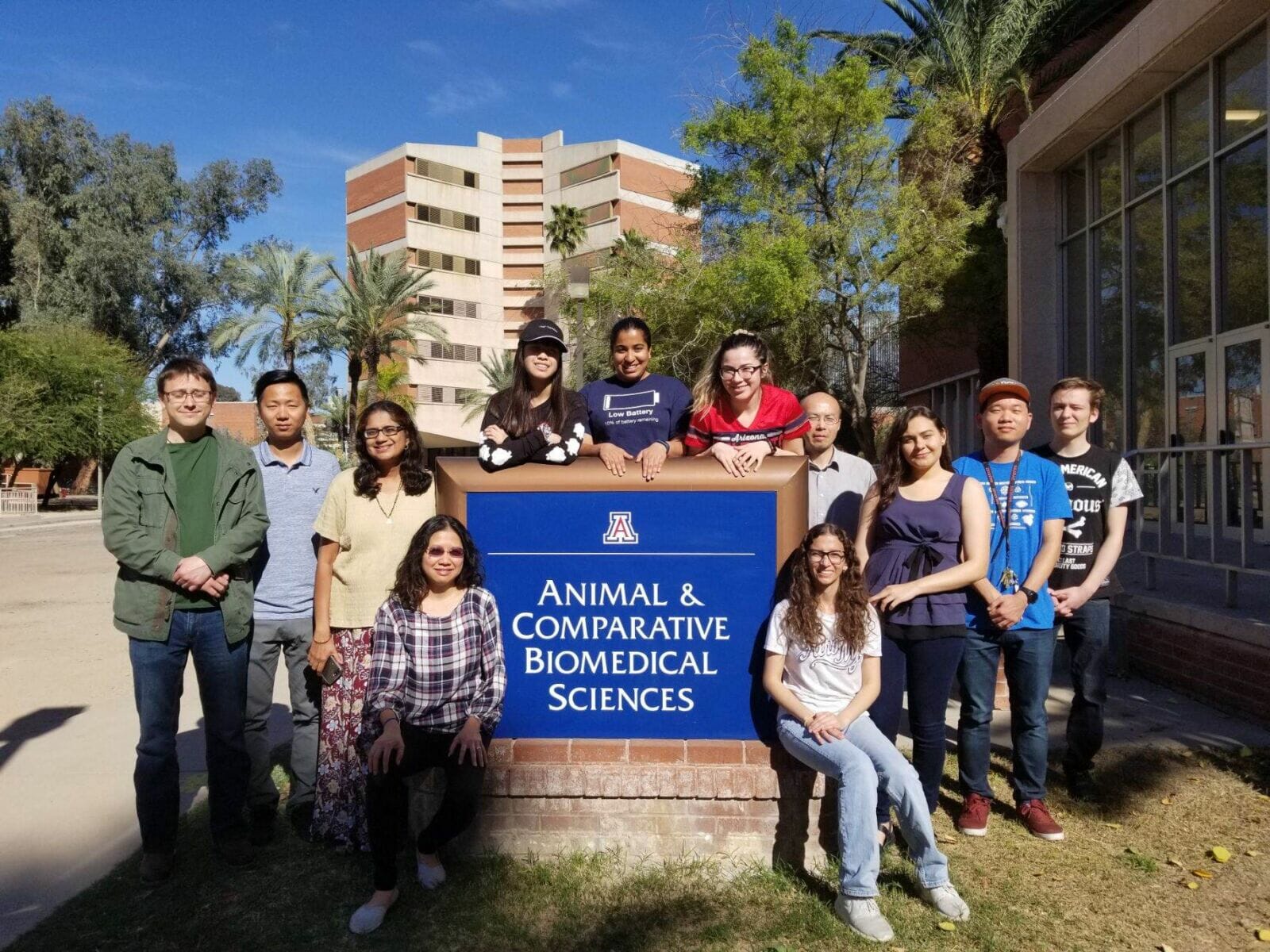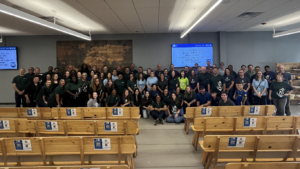The top inventors and entrepreneurs dedicated to commercializing University of Arizona inventions were honored at the eighth annual I-Squared Awards and Expo on Sept. 28.
Tech Launch Arizona, the university office that commercializes inventions stemming from research, hosted the event. Along with honoring top inventors, the evening included an expo where entrepreneurial teams showcased the innovations and startups developed at the UArizona.
Elizabeth “Betsy” Cantwell, UArizona senior vice president for research and innovation, and Tech Launch Arizona Assistant Vice President Douglas Hockstad presented the awards.
READ ALSO: 25 tech startups to watch in Metro Phoenix
“Great research leads to great, impactful innovation, and that innovation leads to commercializable inventions that create jobs, generate opportunity and improve lives,” Cantwell said. “These awards serve two purposes: They showcase these great stories to honor the recipients’ accomplishments, and they serve as examples to inspire other inventors and community members to lean in and get involved in maximizing the impact of UArizona innovation.”
Hockstad noted that “our doors are always open” and invited anyone who wants to learn more and help create impact from UArizona innovation to contact TLA.
“This work of bringing university inventions to the world needs the support of an ecosystem to succeed,” Hockstad said. “While we start with great inventions, it takes help from experts and resources in the community – investors, entrepreneurs, industry experts, alumni connectors – everyone can have a hand in moving technologies out into the world.”
Inventor of the Year: Sadhana Ravishankar
The Inventor of the Year award honors a UArizona innovator who has demonstrated a significant commitment to commercialization throughout their career, with a focus on activity in the past year. Sadhana Ravishankar is an associate professor in the School of Animal and Comparative Biomedical Sciences in the UArizona College of Agriculture and Life Sciences and a member of the BIO5 Institute. She is developing natural antimicrobial products for the marketplace, and last year worked with TLA to launch a new company, PhytoCentric Solutions, to commercialize the inventions developed in her lab.
Ravishankar thanked many who have contributed to her success, including Bibiana Law, PhytoCentric CEO and assistant research scientist in the School of Animal and Comparative Biomedical Sciences; PhytoCentric Chief Strategy Officer Daphne Prusse; Ravishankar’s laboratory staff; and all of her graduate and undergraduate students.
“For a woman entrepreneur to be recognized like this, it makes me feel so empowered, and I hope it serves as a motivation to others,” she said, addressing her next remark to the female researchers and potential inventors in the audience. “Please do not hesitate to pursue your passion. The sky is the limit. Definitely, go for it!”
Startup of the Year: Botanisol Analytics
The Startup of the Year award is given to the company that has had the greatest impact or most significant activity in the past year. Botanisol Analytics was launched to commercialize a laser screener for use in rapidly detecting pathogens including SARS-CoV-2, the virus that causes COVID-19.
Tom Milster, a professor in the James C. Wyant College of Optical Sciences, originally developed the technology Botanisol Analytics integrated into a portable device that can provide results about chemical and biological threats in real time. Law enforcement, military and first responder communities can use the device to protect key personnel and critical infrastructure in the event of a chemical or biological incident. The device, which can be operated by nonmedical personnel, has applications in other industries, as well.
In the past year, the company was recognized by the Intelligence and National Security Alliance and the Office of the Director of National Intelligence. It also received funding from the Air Force Research Laboratory’s Biosurveillance Unit.
“Having finished my Ph.D. at the University of Arizona and now getting to work with Dave Talenfeld, a fellow University of Arizona graduate, at Botanisol, it’s just a thrill to come full circle,” said Botanisol Analytics Director of Business Development Zachary Brooks, who received his doctorate in second language acquisition and teaching through the university’s Graduate Interdisciplinary Programs.
“We’re so thrilled and honored to receive this award,” said Botanisol Analytics CEO Dave Talenfeld.” Our U of A ties run deep.”
Talenfeld received a Master of Business Administration from the UArizona Eller College of Management in 2010. He has two brothers who are also UArizona alumni, and together they hold seven UArizona degrees.
Student Innovator of the Year: Sahand Sabet
The Student Innovator of the Year award is given to a student who has shown excellence in commercialization and intellectual property with a focus on entrepreneurship. Sahand Sabet, a doctoral candidate in the College of Engineering, and his teammates originally approached TLA with an idea for a new generation of robots that can both roll and fly and operate for extended periods of time. The team, along with Collin Taylor, who recently graduated with a bachelor’s degree in business administration finance and entrepreneuership, launched Revolute Robotics to bring the invention to the marketplace.
Sabet and the Revolute Robotics team participated in TLA’s National Science Foundation Innovation Corps customer discovery program. Through the program they learned about additional potential applications for the technology,and they are currently expanding the focus of their company.
In April, the team won the Eller College of Management’s McGuire New Venture Competition for aspiring entrepreneurs.
“Eight months ago I had no idea about the process – how to package things, how to start selling things – and that’s where Tech Launch really helped us,” Sabet said, noting how much assistance the team received from the experienced mentors at TLA. “I’m really honored to receive this award, and I want to thank TLA for all their efforts in giving students a chance to bring an idea and turn it into a product.”
Campus Collaboration: Mark Van Dyke
The Campus Collaboration award honors a person or entity within UArizona whose contributions to commercialization have demonstrated great impact over the last year. Since joining the university in 2020, Mark Van Dyke, associate dean for research at the UArizona College of Engineering, has proactively partnered with TLA to expand innovation and entrepreneurship among faculty, researchers and staff not only at his home college, but also across campus.
Additionally, he is an inventor and entrepreneur who is listed as inventor or co-inventor on 34 issued U.S. patents in the biomedical space and has co-founded three startups.
“[As engineers], we like to work on things that actually improve the quality of life, and there’s a limit to what we can do in our laboratories on campus,” he said. “So to get connected to Tech Launch Arizona and the overall entrepreneurial ecosystem – to build those ties and those strengths and those relationships – that’s really important for us as problem solvers, because at the end of the day, that’s how we have impact.”
Ecosystem Impact: Eric Smith and the University of Arizona Center for Innovation
The Ecosystem Impact award is given to a person or entity outside of the university whose contributions have generated maximum success for UArizona inventions and startups. This year, TLA honored the University of Arizona Center for Innovation – the incubator network for Tech Parks Arizona – and Eric Smith, the center’s executive director. The center services scalable science and technology companies from both within the university as well as other sectors of the community, and even from outside the United States.
Under Smith’s leadership, the center has grown to serve 58 companies. Of those, 35 have UArizona ties and 12 are UArizona startups commercializing university inventions. UACI recently opened an incubator in Oro Valley to support bioscience startups and is implementing programs in Sahuarita, Maricopa and Yuma.
Smith, who earned a bachelor’s degree in business administration business management and an MBA from the Eller College of Management, got his start in technology commercialization working for TLA. There, he led an initiative to build a commercialization network of more than 1,600 experts willing to offer advice to advance UArizona inventions into the marketplace.
“One of the most important feeders we have to our incubator is the technology that is born inside of the research labs at the University of Arizona,” Smith said. “Partners like Tech Launch Arizona are really able to take that innovation, solidify the intellectual property, prepare a startup company to launch and come to an incubator like ours. So when TLA does good work, we already have a head start on helping the resulting startup commercialize their invention and make it to the marketplace.”
He noted that UACI’s success can be attributed to the work of many people, including Carol Stewart, associate vice president of Tech Parks Arizona, UACI Director Anita Bell, and the entire incubator team.
TLA supports entrepreneurship through a variety of initiatives, including training startup teams in customer discovery, providing funding to advance early-stage inventions toward market readiness, and hosting challenges to help students and faculty move innovative ideas from concept to societal impact. In FY2021, TLA took in 274 invention disclosures, had 100 U.S. patents issued, executed 124 licenses and options for UArizona technologies, and launched 17 startups.




